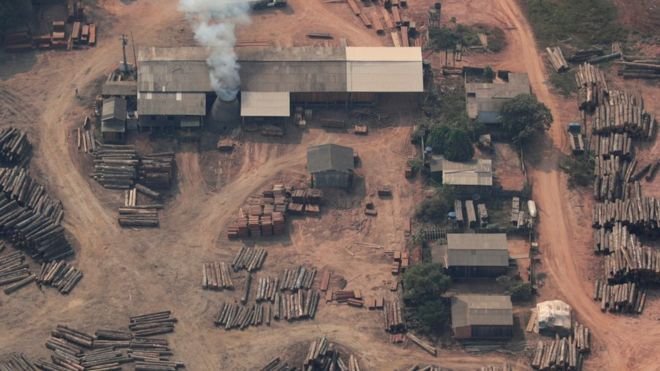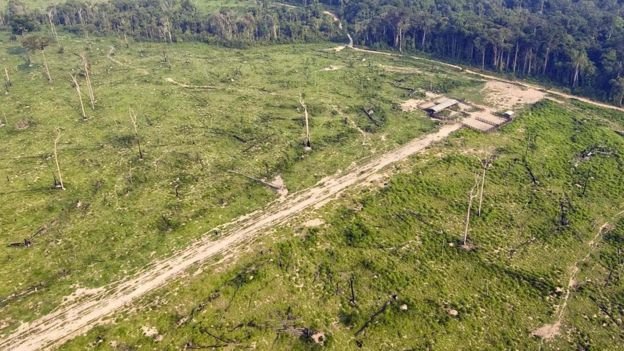
Date: 2026-03-04 Page is: DBtxt003.php txt00017320
Deforestation
Getting worse, not better
World 'losing battle against deforestation'
Peter Burgess

Aerial view of a suspected illegal logging site in Brazil Image copyrightREUTERS A historic global agreement aimed at halting deforestation has failed, according to a report. An assessment of the New York Declaration on Forests (NYDF) says it has failed to deliver on key pledges. Launched at the 2014 UN climate summit, it aimed to half deforestation by 2020, and halt it by 2030. Yet deforestation continues at an alarming rate and threatens to prevent the world from preventing dangerous climate change, experts have said. The critique, compiled by the NYDF Assessment Partners (a coalition of 25 organisations), painted a bleak picture of how the world's forests continue to be felled. Deforestation 'accelerating' 'Since the NYDF was launched five years ago, deforestation has not only continued - it has actually accelerated,' observed Charlotte Streck, co-founder and director of Climate Focus, which co-ordinated the publication of the report. The report says the amount of annual carbon emissions resulting from deforestation around the globe are equivalent to the greenhouse gases produced by the European Union. On average, an area of tree cover the size of the United Kingdom was lost every year between 2014 and 2018.
 Globally, net deforestation continues apace
Tropical forest loss accounts for more than 90% of global deforestation, with the hotspot being located in Amazon Basin nations of Bolivia, Brazil, Colombia and Peru.
Craig Hanson, vice-president of food, forest, water & the ocean at the World Resources Institute, described the findings as a 'mixed report card'.
'There are some places in the world where we are suffering dramatic loss of primary forest, so we are losing the battle on stopping deforestation,' he told reporters.
'In other places, we are finding that there are new trees that are enriching rural landscapes, but we are still seeing a net reduction in the number of forests the world has.'
Emerging hotspot
Worryingly, say the authors, a new deforestation hotspot in West Africa is emerging. The rate of tree-felling in the Democratic republic of Congo has doubled in the past five years.
The New York Declaration on Forests (NYDF) is a voluntary and a legally non-binding agreement to take action to halt global deforestation.
It was first endorsed at the United Nations Climate Summit in September 2014, and by October 2017 40 governments, 57 multi-national companies and 58 non-government organizations had endorsed the declaration.
Political action
Despite the bleak outlook on a global scale, the report did highlight the positive steps being made in Indonesia, which has long been associated with devastating deforestation.
The authors said political action was a contributing factor. The country's president has banned the development of peatlands and primary forests.
However, researchers highlighted why the overall picture was so gloomy and why halting deforestation was so vital in the battle against climate change.
'Halting deforestation and restoring tropical forests, for example, could provide up to 30% of the mitigation required to help meet the Paris Agreement,' explained Eszter Wainwright-Deri, forestry technical advisor at the Zoological Society of London.
'This cannot be achieved while zero-deforestation commitments continue to be dishonoured.'
The WRI's Mr Hanson concluded: 'We are losing the battle but we should not give up hope. This report, among other things, gives a clarion call that we need to re-energise commitment, action and financing towards the NYDF.'
View comments
Related Topics
Environment
Share this story About sharing
Globally, net deforestation continues apace
Tropical forest loss accounts for more than 90% of global deforestation, with the hotspot being located in Amazon Basin nations of Bolivia, Brazil, Colombia and Peru.
Craig Hanson, vice-president of food, forest, water & the ocean at the World Resources Institute, described the findings as a 'mixed report card'.
'There are some places in the world where we are suffering dramatic loss of primary forest, so we are losing the battle on stopping deforestation,' he told reporters.
'In other places, we are finding that there are new trees that are enriching rural landscapes, but we are still seeing a net reduction in the number of forests the world has.'
Emerging hotspot
Worryingly, say the authors, a new deforestation hotspot in West Africa is emerging. The rate of tree-felling in the Democratic republic of Congo has doubled in the past five years.
The New York Declaration on Forests (NYDF) is a voluntary and a legally non-binding agreement to take action to halt global deforestation.
It was first endorsed at the United Nations Climate Summit in September 2014, and by October 2017 40 governments, 57 multi-national companies and 58 non-government organizations had endorsed the declaration.
Political action
Despite the bleak outlook on a global scale, the report did highlight the positive steps being made in Indonesia, which has long been associated with devastating deforestation.
The authors said political action was a contributing factor. The country's president has banned the development of peatlands and primary forests.
However, researchers highlighted why the overall picture was so gloomy and why halting deforestation was so vital in the battle against climate change.
'Halting deforestation and restoring tropical forests, for example, could provide up to 30% of the mitigation required to help meet the Paris Agreement,' explained Eszter Wainwright-Deri, forestry technical advisor at the Zoological Society of London.
'This cannot be achieved while zero-deforestation commitments continue to be dishonoured.'
The WRI's Mr Hanson concluded: 'We are losing the battle but we should not give up hope. This report, among other things, gives a clarion call that we need to re-energise commitment, action and financing towards the NYDF.'
View comments
Related Topics
Environment
Share this story About sharing